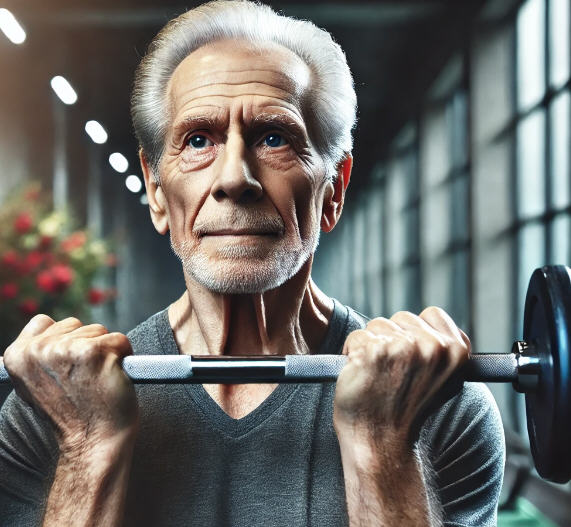Staying Active: How Fitness Defines the Aging Journey
Aging Doesn’t Mean Decline—It’s a ChoiceThere’s a common belief that aging inevitably leads to decline—weakness, illness, and dependency. But my father’s life proved otherwise. He was living proof that age doesn’t have to steal your strength or vitality. His story is one of resilience, determination, and the transformative power of fitness in shaping how we age. |
 |
Defying Age with Strength and Determination
Even in his late 70s, my father was lifting weights that many younger men would struggle with. His commitment to fitness wasn’t just about looking strong; it was about staying strong—physically, mentally, and emotionally.His journey with chronic back pain began in his 20s. For many, that kind of pain would have been a reason to avoid strenuous exercise. But not for him. After every surgery and recovery, he returned to the gym as soon as he could.
To him, the gym wasn’t just a place to build muscle—it was where he built his character. Exercise wasn’t a chore; it was his lifeline. It was his way of fighting back against the setbacks life threw his way.
Cancer Didn’t Stop Him—It Fueled His Fight
Then came the cancer diagnosis. For most, this would have been a reason to slow down, to focus solely on survival. But my father? His first thought wasn’t just about beating cancer—it was about getting back to the gym.“I’ve gotta beat this so I can get back in the gym,” he would say with a conviction that could move mountains.Even as cancer took its toll, his spirit remained unshaken. He followed his doctors’ instructions, even when they were tough, often with a bit of grumbling—but always with the determination of a fighter. To him, cancer was just another obstacle, like his back surgeries, something temporary he would push through.
Strength Is More Than Physical—It’s Mental and Emotional
His positive attitude didn’t just fuel his own fight—it inspired everyone around him. He stayed in touch with family, even distant cousins, reminding us all that life isn’t just about staying physically active—it’s about staying connected.Even in his final years, when cancer had weakened his body, his mind remained sharp. He refused to let illness define him.
Aging with Strength: A Tale of Two Paths
At just shy of 81, my father passed away after fighting cancer for more than three years. Without the illness, he would have remained one of the strongest, most active people I knew. The contrast between him and others in our family was striking. Those who didn’t make fitness a priority began declining much sooner, losing their independence early. Some were frail by their mid-60s, while my father remained engaged in life, physically and mentally strong. I see it in others too—two relatives, both now 80, but living vastly different lives:- One has stayed active. He moves slower than before, but with confidence. No shuffling feet, no frailty—just purposeful movement.
- The other never prioritized exercise. Now, he relies on a walker just to get around.
The Power of Fitness in Aging Gracefully
People often say decline is inevitable. Maybe they’re right—to a point. But the extent of that decline? That’s up to us.Fitness is more than a way to stay in shape; it’s the key to living fully versus merely existing. My father’s story is proof that we have a choice in how we age.
Even in his final days, his fighting spirit never faded. Exercise had given him the strength to face every challenge—from chronic pain to cancer—with unbreakable resilience.
Aging Is Inevitable, but Strength Is a Choice
Yes, our bodies will change as we age. But we have a choice in how we face those changes.My father chose to fight. To lift. To stay strong.
And in that choice, he lived a life of power, connection, and purpose—right until his very last breath.
“Our bodies may age, but our commitment to strength and health can keep us living fully—no matter how old we get.”
Articles that Benefits Health :
Habits of Super Healthy People
In a world filled with endless health advice and fad diets, the quest for optimal well-being can feel like navigating through a labyrinth. However, amidst the noise, there exists a group of individuals who seem to effortlessly radiate vitality and energy.......
Exercises for Staying Strong as we Age
Aging gracefully isn't just about counting years; it's about nurturing a vitality that transcends time. In this guide, we'll delve into the art of staying strong and attractive, inside and out. From the sturdy foundation of good posture.......
Mystery Behind Those Who Seem To Breeze Through The Day With Just One or Two Meals
You're sitting at your favorite cafe, sipping on a steamy latte, when suddenly you catch sight of someone gracefully gliding past, seemingly unfazed by the tantalizing aroma of freshly baked pastries. How do they do it.......
Home Page : Motivation Stuff ==> Staying Healthy
All the site contents are Copyright © www.motivationstuff.com
and the content authors. All rights reserved.
Every effort is made to ensure the content integrity.
Information used on this site is at your own risk.
All product names are trademarks of their respective
companies.
The site www.motivationstuff.com is in no way affiliated
with or endorsed by any company listed at this site.
Any unauthorised copying or mirroring is prohibited.